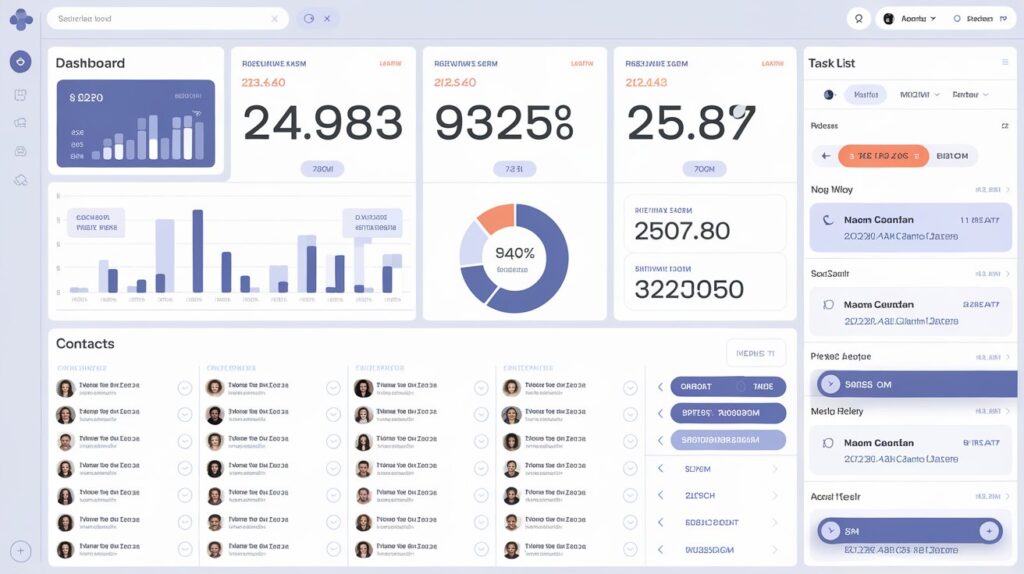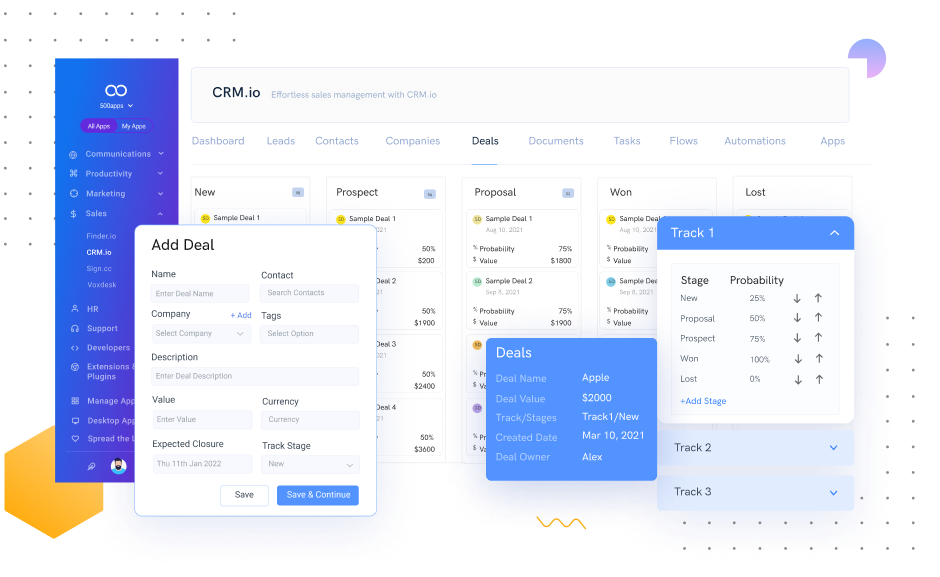INTRODUCTION
CRM Software: The Ultimate Guide to Supercharging Your Customer Relationship and Ensuring Business Success Introduction: Why CRM holds an important place in the present business scenario
Business, in today’s world of fast movement and hyper-competition, is all about customers. Any given business will more often than not find its successes or failures depend on one valuable factor – the ability to formulate, nurture, and cultivate solid relationships with its customers. That is where CRM software steps in. After all, CRM software was devised to assist businesses with the management of relations with current and future customers; therefore, its very objective is to ease those processes for boosted profitability.
I recall how cumbersome it used to be to handle information about the customer base since the dawn of my sales career. We used spreadsheets, sticky notes, and even paper files to track leads and interaction with existing customers. Of course, it was really chaotic. But then everything flipped when our company opted to invest in CRM software. In one stroke of genius, we could hold customer information in one central command, track all the interactions, and collaborate way better. It became a game-changer.
This tutorial is the major coverage of everything one has to know about CRM software: key features and benefits provided by it, how this tool is able to change business operations. Further on, several variations in CRM software will be discussed, followed by a selection of appropriate software and guidelines on how it must be implemented. Along the way, I will interject many personal stories and anecdotes to illustrate how very real-world changes have been brought about by CRM software on behalf of businesses of every size.

Table of Contents
What is CRM?
Customer Relationship Management is a class of software that enables an enterprise to manage and track every interaction with current or future customers, clients, or prospects. For all practical purposes, CRM is a database that maintains data on all of an organization’s customers and records customer interactions while automating some aspects of the sales, marketing, and customer service cycles.
But CRM software is so much more than a mere database. It’s really a very powerful business tool-one that amplifies customer satisfaction and sales for further growth. The 360-degree view into the customer lets each business create an experience tailored precisely for customers, predict their needs, build solid relationships in the process, and finally provide solutions through all means necessary. CRM basically focuses on enhancing customer relationship management.
Key Features of CRM Software
Contact Management: CRM allows an organization to store information about its clientele, including contact information, correspondence history, and preference lists. Then it provides this information to all employees on the front lines so that the customer has a consistent and personalized experience with whomever is interfacing with them.
Lead Management: The CRM software helps track the leads that are coming into the sales pipeline from different channels, right from capturing to conversion. This is about capturing a lead from various sources, assigning the Lead to the concerned Sales Representatives, and follow-ups on progress through stages for conversion in the Sales Pipeline.
Automating Sales: Most of the activities along the sales cycle, sending follow-up emails, and fixing appointments are automated in the CRM software. This saves actual time for the sales representative to build up a relationship and close the deal.
It is also used in marketing automation, sending e-mail campaigns, posting to social media, and lead nurturing. Marketing automation with integrated CRM empowers businesses to deliver very much targeted and personalized on-time messages to customers.
Customer Service Management: Definitely, CRM software will permit companies to manage customer inquiries, support tickets, and service requests. This would ensure that problems are fixed on time and hence better satisfaction and loyalty amongst customers.
Reporting and Analytics: Good insights range from customer behavior, sales performance to the effectiveness of marketing using CRM software. These in turn would be used in making more data-driven decisions to achieve business process optimization.

Evolution of CRM Software
Although the general concept of CRM can find its roots as early as the 1980s, when firms first started to use database marketing in attempts to trace customer contact and personalize marketing, it wasn’t until the 1990s that CRM software, as we know it today, began to arise. Early CRM systems were applied primarily for SFA. Earlier CRM systems allowed the sales force to manage leads, track contact with customers, and even some forecasting for sales.
But as technology evolved, CRM software started to focus more on marketing automation, customer service management, and analytics. The internet that appeared in the 2000s and later cloud computing brought about a more surefire transformation of CRM software-to become cheaper and available even for businesses of any size. Nowadays, CRM software has taken its place as an essential element in the evolution of businesses in quite a few industries-from small startups to large enterprises.
Benefits of CRM Software: It Can Change Your Business by a Mile
The incorporation of CRM software can bring sea change in your business-right from putting smiles on the faces of your customers to improved bottom-line sales. Following are some of the key benefits of CRM software:
1. Improvement in Customer Relationships
The big benefit of using CRM software is its relationship-building capability in relation to customers. This is because the CRM software provides a unified database that may enable the firm to provide personalized experiences that may help anticipate what each customer will need and respond promptly to whatever inquiry or problem.
I have had to deal, for instance, with a small e-commerce company that could not bear the weight of customers inquiring and laying their complaints. Since there were no systems to handle customer interactions, responses came late, and so would frustrate customers. By deploying CRM software, they smoothened their operations within customer service and hence had the capability to promptly respond to queries, hence improving customer satisfaction. The ratio of customer retention was remarkably increased.
2. Increased Sales and Revenue
It will further enable the business organization to increase its sales and revenues, as this software optimizes leads management, automates some of the sales stages, and provides important insights into customers’ behavior. In managing leads in the sales pipeline, CRM software ensures that no opportunities slip through the cracks, with representatives putting focus on the best prospects.
I also remember that selling team which was unable to close any deal. They were dependent on some sort of really obsolete style by which leads were tracked-meaning they would skip follow-ups and missed opportunities. Since the introduction of CRM software, it had become viable for them to track leads much more effectively and then give way higher significance to high-value prospects for closing deals faster. And within a few months, they drove.

3. More Efficiency in Marketing
It will also help businesses in improving efficiency at the point of marketing by making use of its centralized platform for campaigns, tracking interaction with customers, and performance analysis. Equipped with integrated marketing automation and CRM, businesses can send timely and personalized messages to customers for better conversion rates and higher ROI.
For example, I needed to work with a marketing team that had poor campaign efficiency monitoring. That is, they could not tell from which channel they were going to get the most leads or what kind of message would be more engaging for the audience. Application of CRM software combined with integrated marketing automation allowed tracking of campaigns’ efficiency, segmenting their audience, and thus providing more personalized messages. All the above changes contribute much to betterment in lead generation and conversion rates.
4. Better coordination and communication:
CRM software coordinates and communicates the employees within an organization. Due to the very nature of this software, information about customers is kept centrally for storing and sharing purposes. This way, it gets assured that the same knowledge is available with all the group members, and they can work together in accordance with providing satisfaction to customers more effectively.
I will never forget the case of working with a team that had the worst results in terms of collaboration on customers’ accounts. Each of them kept information about clients in different tools, which then naturally led to lots of misunderstandings and misconceptions. Implementation of CRM software allowed them to house everything under one roof and collaborate way more effectively. Their internal operations were on the spot, while customers’ needs were met in a manner they had never experienced.
5. Data-Driven Decision Making Some of the major insights reports and analytics are located within CRM software.
Organizations, using it, hunt for customer data, sales performance, and marketing effectiveness in order to make informed decisions that will help optimize internal company processes for greater growth.
I have dealt, for instance, with a company that could not come to the root of why its sales decline. They all had this data; what they lacked was any good mechanism to analyze it effectively. By introducing CRM software supported with advanced analytics, they were able to pinpoint the trends and hidden opportunities that help in deriving strategic decisions that changed their tide in sales.
Types of CRM Software: Finding the Right Fit for Your Business
Indeed, there are a lot of different types of CRM software out there, each designed to suit the peculiar needs of various businesses. Knowing the types of CRM software will further help you select the right solution for your business.
1. Operational CRM
Operational CRM was designed to automate and make simpler every business process that touches the interaction with the client. Thus, it includes three major components of selling, marketing, and customer service. Such CRMs are designed to raise efficiency and productivity by automating most of the tasks on lead management, e-marketing, and after-sales support.
This can be utilized best in organizations where there is immense interaction with the customers, and there is a justifiable need for streamlining. Sales departments, marketing departments, and customer service departments are the major implementers of this.
2. Analytical CRM
Analytical CRM basically deals with the analysis of customer data for conclusions to be drawn on their behaviors, preferences, and trends. This category of CRM software will avail the organization with the capability and potentiality to analyze the diversified data emanating from customer interactions, sales transactions, and marketing campaigns.
In other words, it means that the analytical CRM would suit only those businesses that make decisions on the basis of data or those who want deep information about the customers. It finds its biggest application in marketing teams amongst data analysts and business intelligence professionals.
3. Collaborative CRM
Collaborative CRM, also known as Pivotal CRM, has the primary purpose of harmonizing the communications and coordination of efforts inside the enterprise between other departments and those with its customers. This type of software supports sharing customer information, the coordination of activities, and multichannel customer interaction management.
It is employed in those organizations where coordination needs to be comprehensive among its sales, marketing, and customer service teams. It finds application in those areas where the interaction of customers is of high intensity, thereby involving several sections of business operations.

4. Social CRM
Social CRM is the latest avatar of the CRM software, wherein much emphasis is laid on incorporating social media interactions with traditional CRM processes. This kind of CRM software enables screening of social media channels by a business for the purposes of engaging its customers and data analysis for finding out customer sentiment and preference.
It suits businesses whose very existence is based on interaction with customers via social media and management of brands. It is also extensively used by social media managers, marketing teams, and customer service teams.
5. Mobile CRM
Mobile CRM works to make the majority of the capabilities of CRM and data accessible from mobile devices: notably, smartphones and tablets. Such CRM software application enables sales representatives, customer service agents, and other
